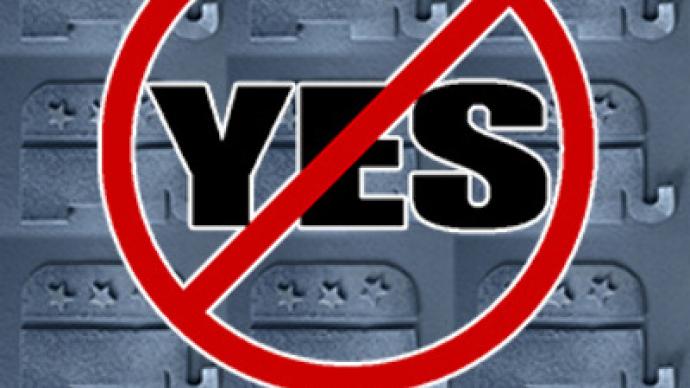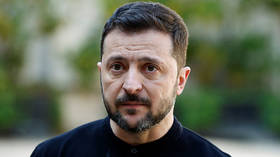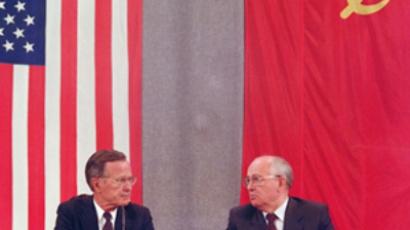Will US Republicans shoot down START treaty?

President Barack Obama, on a political roll after passing his healthcare reform legislation, is set to face severe Senate scrutiny over his administration’s arms-reduction treaty with Russia.
Obama and Russian President Dmitry Medvedev met in Prague on Thursday to sign the successor to the 1991 Strategic Arms Reduction Treaty. The long-fought document commits both nations to slashing the number of strategic nuclear warheads by one-third, and more than halving the number of missiles, and the submarines and bombers carrying them.
While the atmosphere in the Czech Republic following the signing ceremony was one of jubilation, back on Main Street, USA the enthusiasm is much more muted as the Republicans search for ways to paint the treaty as a threat to US security.
The partisan battle over the American president’s new nuclear initiative was best captured by Fox News during its coverage of Obama’s departure for Prague, the chosen venue for the historic signing between the two former cold war foes.
“President Obama heading for the Czech Republic as we speak,” started the Fox anchor, who spoke as if she were reporting on the sinking of the Titanic. “Set to sign a new nuclear pact with Russia. Now critics are asking: Will the new deal leave the US defenseless… until it’s too late?”
This is exactly the sort of argument that many members of the US Senate, most of them from the Republican Party, will be making in an effort to derail Obama’s ongoing efforts to “reset” relations with Moscow, which many political pundits continue to associate with the defunct Soviet Union, as opposed to the capital of a modern and democratic Russian Federation.
It is important to remember in this context that Obama's Democrats enjoy a robust majority – but not the required 67, or two-thirds, vote necessary to seal the deal without Republican support.
Stephen Rademaker, former head of the State Department's arms control bureau, suggested that some US senators might cast their vote against the treaty since the Russians, according to him, intend to use it as leverage to stop US missile defense initiatives already declared by Obama.
"Is there an intention on both sides to live with this treaty, or are the Russians essentially coming to this wedding declaring that they want to get married but they don't intend to live in holy matrimony?" Rademaker asked during a forum at the Heritage Foundation in Washington this week, as reported by Reuters.
Meanwhile, Obama said the new treaty will not impinge upon US plans for missile defense, which should satisfy at least some of the Republicans in the Senate. But he failed to mention if the “verification regime” applies to any US missile defense batteries that may pose a threat to Russia."The treaty does not contain any constraints on testing, development or deployment of current or planned US missile defense programs or current or planned United States long-range conventional strike capabilities," according to a White House statement.
“Once signed and submitted, the new treaty can expect close scrutiny by the Senate,” wrote Strobe Talbott, the former US Deputy of State under the Clinton administration and president of the Brookings Institution. “Since the agreement affects vital US security interests, it should receive nothing less.”
But Talbott seems confident that the Senate will conclude that the Treaty does not compromise America’s security interests.
“A final judgment will have to wait until we see the detailed treaty provisions,” Talbott continued. “But based on what we know to date, the treaty will deserve to pass the merit test in the Senate.”
The Republicans seem to understand that it would be politically risky to voice too many objections to the START treaty, especially when they are beginning to require a reputation as the “just say no” party. Thus, they have decided instead to take up arms against Obama’s revised Nuclear Posture Review (NPR), which was released Tuesday, two days before the START signing.
The White House’s revised nuclear doctrine states that the US commits itself “to reduce the role of nuclear weapons in deterring non-nuclear attacks.” The new enemy-friendly approach applies to “states that are party to the Nuclear Non-Proliferation Treaty and in compliance with their nuclear non-proliferation obligations.” Clearly, this is a thinly veiled allusion to North Korea and Iran to get on board the NPT, or face international sanctions – or worse. Still, some Republican (and neoconservative) commentators say Obama’s new nuclear strategy weakens America’s defenses.
Charles Krauthammer, a Washington Post columnist, whom the Financial Times in 2006 called “the most influential commentator in America”, provided a completely misleading assessment of Obama’s nuclear doctrine in an interview with Fox News.
In the event of a biological attack on the United States, Krauthammer said “the White House lawyers would ascertain if that country is in compliance with the NPT… and if it is… it gets immunity from a massive nuclear retaliation.”
He then suggests that the Obama administration, if it found itself in such a situation [biological attack from a nation that complies with the NPT regime], would be forced to resort to “TNT and marines shooting guns,” a non-apocalyptic scenario that he somehow finds “insane or ridiculous.”
The irony of the Republicans feigning fear at the thought of doing business with the Russians is that it is actually Moscow that is rightly apprehensive of the deal.Although it seems beyond doubt that the Russian Duma will give its legislative blessing to the treaty, Russian Foreign Minister Sergey Lavrov this week said that Moscow reserves the right to withdraw from the new START treaty if US missile defense threatens Russia’s national security.
"The Russian Federation will have the right to withdraw from the (new) treaty if the quantitative and qualitative growth of the potential of the US strategic anti-missile defense starts exerting substantial influence on the efficiency of the Russian strategic nuclear forces,” Lavrov told reporters on Tuesday. “It goes without saying that we ourselves will determine the degree of this influence."
Although Obama’s Nuclear Posture Review has no bearing on the START treaty, Republicans are using it to suggest that Obama is exposing the United States to outside threats. The same ridiculous argument continues to be forwarded whenever his administration attempts to try the detainees of Guantanamo Bay in US civilian courts as opposed to closed-door military tribunals, which only suggests that the Bush administration has much to lose if “the terrorists” are permitted to speak their minds in an open court. But that’s another story.
In the final analysis, the US Republicans are acutely aware that Obama has made nuclear non-proliferation one of the pillars of his presidency, and in the spirit of American political games, the games will certainly continue. With mid-term elections just around the corner, the Republicans will ramp up the rhetoric that Obama is weakening the nation’s resolve before a “resurgent Russia.”
But it was exactly such tired, worn-out clichés that helped Obama win the White House in the first place. The Republicans will have to do much better than mere fear mongering if they hope to derail START in the Senate.
Read also – New START Treaty Triggers Development of Non-Nuclear Arms














